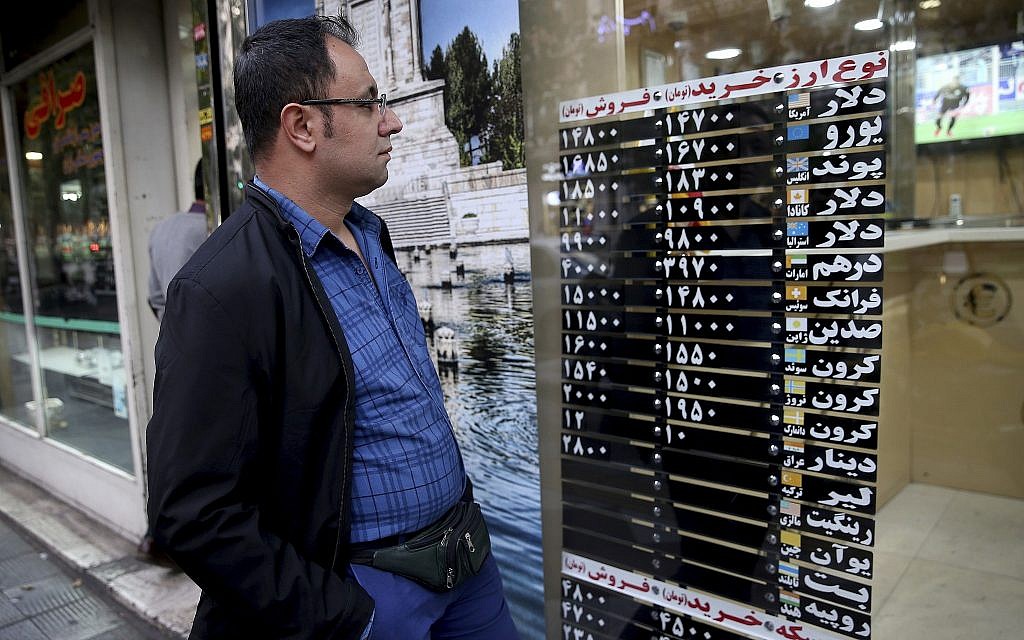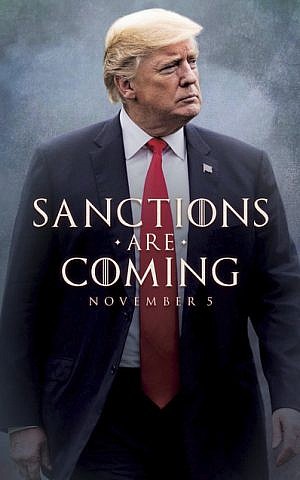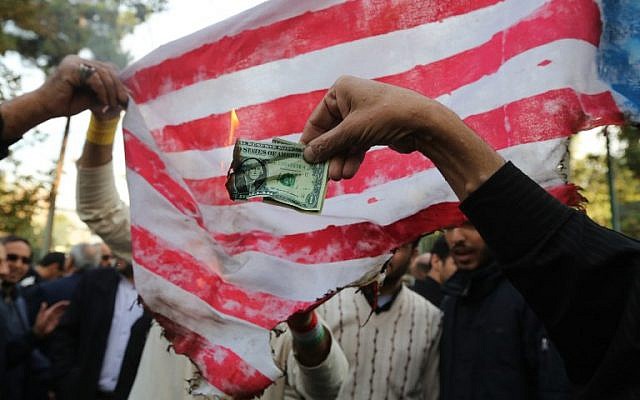Analysts say Tehran is unlikely to cave quickly, will hope for a new US administration in 2020; a blue wave during Tuesday’s midterms may give it enough hope to hold out

Israeli officials on Monday celebrated the US administration’s imposition of the toughest-ever sanctions on Iran as a “historic day” and “sea-change” in the Middle East.
“This is a great day for the future of Israel,” Prime Minister Benjamin Netanyahu gushed, adding that the impact of these sanctions is already seen “on the ground right now.”
But Israeli analysts, including those sympathetic to Netanyahu’s Iran policies and in favor of sanctions, say there is no way of knowing how the Iranian-American standoff is going to end. Even the Iranians may not know, but they will likely have a better idea come Wednesday, after the dust settles from the US midterms.
“The Iranians are closely watching the results of the American midterm elections [which are taking place on Tuesday]. If the Republicans do badly, the Iranians will be given hope that they can outlast Trump. But if the Republicans do well, or if it’s a close call between Republicans and Democrats, then the Iranians will worry,” said Meir Javendafar, who lectures on Iran at the Interdisciplinary Center Herzliya.
There is little doubt that the latest round of sanctions, targeting Iran’s banking and oil industries, will badly hurt the country’s economy and may deepen the unrest that already exists among large parts of the population.
It remains unclear, however, whether that will be enough to topple the Islamic Republic, or even to force it to renegotiate a new nuclear agreement.
“Senior Iranian officials saying that the sanctions have no effect does not mean that they failed and that Iran is not bothered by them. And Iranian Foreign Minister [Javad Zarif] saying that his country is ready to negotiate with the US if it changes its approach does not mean that the sanctions succeeded and that Iran succumbed to pressure,” said Raz Zimmt, an expert on Iran from Tel Aviv University.

“It a long conflict; we’re just at its beginning,” he said.
Either way, the Iranians will not rush to give in to the Americans’ demands, because they feel they have adhered to the 2015 nuclear deal, while the US unilaterally walked away from it, Javendafar said.
“I’d be surprised if Iran shows any willingness to compromise before the 2020 US presidential elections,” he said. “If Trump wins in 2020, Iran will have four very tough very years ahead, and it could be more likely for Iran to negotiate.”
But if a Democrat moves into the White House, Iran will hope for a much better deal, perhaps even a rerun of the 2015 Joint Comprehensive Plan of Action championed by Obama, he said.
Soli Shahvar, the founding director of the Ezri Center for Iran & the Persian Gulf at Haifa University, agreed that the Iranians are holding out hope for a new US administration “with Obama-like policies,” which will be more amenable to negotiating another agreement that is more to their liking.
“Within two years, we will know in which direction this goes,” he said. “And two years is a short time in the Middle East.”
Either way, the Iranians will not rush to give in to the Americans’ demands, because they feel they have adhered to the 2015 nuclear deal, while the US unilaterally walked away from it, Javendafar said.
“I’d be surprised if Iran shows any willingness to compromise before the 2020 US presidential elections,” he said. “If Trump wins in 2020, Iran will have four very tough very years ahead, and it could be more likely for Iran to negotiate.”
But if a Democrat moves into the White House, Iran will hope for a much better deal, perhaps even a rerun of the 2015 Joint Comprehensive Plan of Action championed by Obama, he said.
Soli Shahvar, the founding director of the Ezri Center for Iran & the Persian Gulf at Haifa University, agreed that the Iranians are holding out hope for a new US administration “with Obama-like policies,” which will be more amenable to negotiating another agreement that is more to their liking.
“Within two years, we will know in which direction this goes,” he said. “And two years is a short time in the Middle East.”

But he noted Iran is already in bad shape economically, and that it was possible that the public’s anger over their financial hardships and the regime’s policies will lead to an uprising spelling the end of the Islamic Republic within a few years.
“The Iranian regime is not in a good position,” he said.
Maj.-Gen. (Ret.) Yaakov Amidror, Netanyahu’s former national security advisory, said it was at least worth a shot to see if sanctions could put enough pressure on Iran to change its support for terrorism and renegotiate the nuclear agreement.
Amidror acknowledged that the lack of worldwide support for the renewed sanctions, as well as temporary US waivers granted to eight countries to continue buying Iranian oil were far from ideal.
“Things could always be done better. But we we will have to try to see if it’ll work,” he said.
“If they don’t try, we will never know,” he said. “What’s the alternative, to bomb Iran? This can always be done later.”
As reported by The Times of Israel
